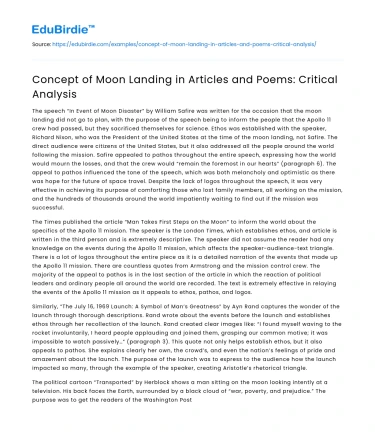The speech “In Event of Moon Disaster” by William Safire was written for the occasion that the moon landing did not go to plan, with the purpose of the speech being to inform the people that the Apollo 11 crew had passed, but they sacrificed themselves for science. Ethos was established with the speaker, Richard Nixon, who was the President of the United States at the time of the moon landing, not Safire. The direct audience were citizens of the United States, but it also addressed all the people around the world following the mission. Safire appealed to pathos throughout the entire speech, expressing how the world would mourn the losses, and that the crew would “remain the foremost in our hearts” (paragraph 6). The appeal to pathos influenced the tone of the speech, which was both melancholy and optimistic as there was hope for the future of space travel. Despite the lack of logos throughout the speech, it was very effective in achieving its purpose of comforting those who lost family members, all working on the mission, and the hundreds of thousands around the world impatiently waiting to find out if the mission was successful.
The Times published the article “Man Takes First Steps on the Moon” to inform the world about the specifics of the Apollo 11 mission. The speaker is the London Times, which establishes ethos, and article is written in the third person and is extremely descriptive. The speaker did not assume the reader had any knowledge on the events during the Apollo 11 mission, which affects the speaker-audience-text triangle. There is a lot of logos throughout the entire piece as it is a detailed narration of the events that made up the Apollo 11 mission. There are countless quotes from Armstrong and the mission control crew. The majority of the appeal to pathos is in the last section of the article in which the reaction of political leaders and ordinary people all around the world are recorded. The text is extremely effective in relaying the events of the Apollo 11 mission as it appeals to ethos, pathos, and logos.
Save your time!
We can take care of your essay
- Proper editing and formatting
- Free revision, title page, and bibliography
- Flexible prices and money-back guarantee
Similarly, “The July 16, 1969 Launch: A Symbol of Man’s Greatness” by Ayn Rand captures the wonder of the launch through thorough descriptions. Rand wrote about the events before the launch and establishes ethos through her recollection of the launch. Rand created clear images like: “I found myself waving to the rocket involuntarily, I heard people applauding and joined them, grasping our common motive; it was impossible to watch passively…” (paragraph 3). This quote not only helps establish ethos, but it also appeals to pathos. She explains clearly her own, the crowd’s, and even the nation’s feelings of pride and amazement about the launch. The purpose of the launch was to express to the audience how the launch impacted so many, through the example of the speaker, creating Aristotle’s rhetorical triangle.
The political cartoon “Transported” by Herblock shows a man sitting on the moon looking intently at a television. His back faces the Earth, surrounded by a black cloud of “war, poverty, and prejudice.” The purpose was to get the readers of the Washington Post to realize that they should not turn their back on the problems the Earth was facing because of the moon landing. This also appealed to pathos as it shows that everyone’s attention was on space exploration and not on all of the problems closer to home.
In the poem written by Archibald MacLeish entitled “Voyage to the Moon,” MacLeish effectively illustrated the significance of the moon landing through its appeals to ethos, pathos, and logos. MacLeish was the Librarian of Congress during World War II, which establishes ethos. In reference to the moon, MacLeish stated, “you were a wonder to us, unattainable, a longing past the reach of longing…” (lines 12-14). These lines are a strong example of pathos as it expresses mankind’s extreme desire to learn about the moon. He then appealed to logos by saying that this desire was met after three days of travel. This poem was published the day after the moon landing, with the hopes of encompassing its importance.






 Stuck on your essay?
Stuck on your essay?

